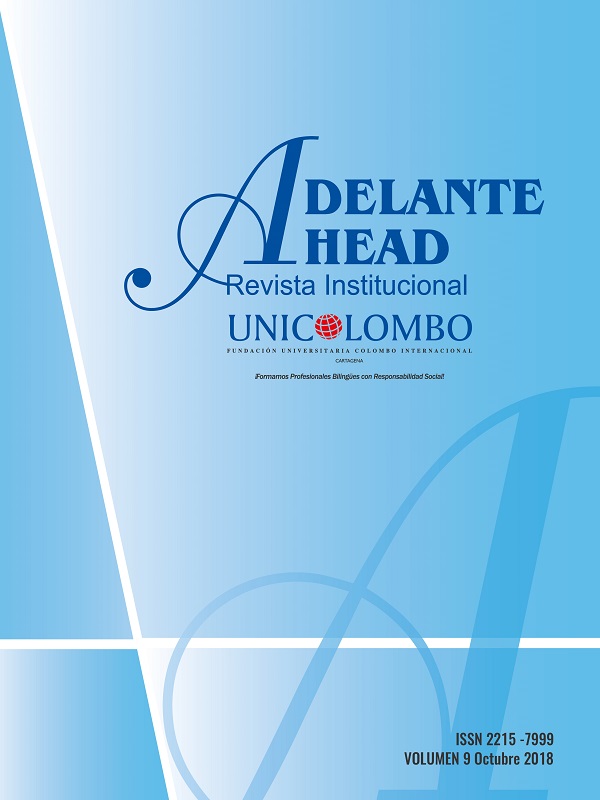INFERENTIAL READING COMPREHENSION SKILLS ENHANCED THROUGH THE QUESTION-ANSWER RELATIONSHIP STRATEGY IN LEARNERS FROM CENTRO CULTURAL COLOMBO AMERICANO CARTAGENA
Resumen
Abstract: This action research study aims to present how a specific strategy: Question- Answer Relationship improves inferential reading comprehension and the skills associated to it. The study units were nine students who were asked to take an initial questionnaire in order to collect information about their strengths and weaknesses related to reading comprehension. Throughout the course, students were instructed on how to apply the mentioned strategy. Four specific activities were given to them in order to collect enough information about if the strategy was working or not. Also, students filled out reading logs, therefore information about the whole process from their perspective was gathered. Findings suggests that intervention was helpful and students responded fairly well to the implementation of the strategy.
Keywords: Reading comprehension skills, question-answer relationship strategy, inferential reading comprehension
Descargas
Citas
References
Almasi, J. F., & Fullerton, S. K. (2012). Teaching strategic processes in reading. New York: Guilford PressGuilford Press.
Berg, B. L. (2004). Methods for the social sciences. USA: Pearson Education Inc. United States of America.
Burns, A. (2003). Reading practices: From outside to inside the classroom. TESOL Journal, 12(3), 18-23.
Braga Tomich, L. (2000). Designing Reading Tasks to Foster Critical Thinking. Ilha do Desterro A Journal of English Language, Literatures in English and Cultural Studies (cursiva). 38, p. 83- 90.
Chikalanga, I.(1992). A Suggeted Taxonomy of Inferenes for the Reading Teacher, Zambia, University of Zambia, Reading in a foreing language, 8, pp- 697 -709.
Creswell, J. W. (2013). Research design: Qualitative, quantitative, and mixed methods approaches. London: Sage Publication.
Davies, F. (1995). Introducing reading. Penguin English.
Etikan, I., Musa, S. A., & Alkassim, R. S. (2016). Comparison of convenience sampling and purposive sampling. American Journal of
Theoretical and Applied Statistics, 5(1), 1-4.
Czisco, C., Greenleaf, C., Hurwitz, L. & Shoenbach, R. (2000) What is reading? An excerpt from “Reading for Understanding”. The quarterly, 22 (3).
Freebody, P., & Luke, A. (1990). Literacies programs: Debates and demands in cultural context. Prospect: An Australian Journal of TESOL, 5(3), 7-16.
G. Woolley, Reading Comprehension: Assisting Children with Learning Difficulties, Springer Science
+Business Media B.V. 2011
Gascoine, C. (2005). Toward an Understanding of the
relationship between L2 reading Comprehension and gramatical competence. The Reading Matrix, 5 (2).
Graddol, David (2006). English Next. London: British Council.
Grabe, W. P., & Stoller, F. L. (2013). Teaching and researching: Reading. Routledge. Hosenfeld, C. (1976). Discovering our students' strategics. Foreign Language Annals, 9, 117-130.
Israel, S. E. (2007). Using Metacognitive Assessments to Create Individualized Reading Instruction.
International Reading Association. 800 Barksdale Road, PO Box 8139, Newark, DE 19714-8139.
Iwai, Y. (2011). The effects of metacognitive reading strategies: Pedagogical implications for EFL/ESL teachers. The Reading Matrix 11 (2), 150, 159.
Jett-Simpson, M. (1990) Toward an ecological assessment of reading progress. 3rd ed. Schoefield, Wis:
Wisconsin State Reading Association.
Jones, R. C. (2007) ReadingQuest.Org. Strategies for reading comprehension. Comparison contrast chart.
Kirsch, I., De Jong, J., Lafontaine, D., McQueen, J., Mendelovits, J., & Monseur, C. (2003).
Lyutaya, T. (2011). Reading Logs: Integrating Extensive Reading with Writing Tasks. English Teaching Forum (cursiva). (49)1, p. 26-34.
McNiff, J. (2016). You and your action research project.
Routledge.
Nunan, D. (1992). Research methods in language learning.
Cambridge University Press.
Pearson, P.D. and Johnson, D. (1978). Teaching readingcomprehension. New York: Halt, Rhinhart and Winston
Pennell, D. (2002). Explicit instruction for implicit meaning: Strategies for teaching inferential
reading comprehension. Considerations: Inferential Comprehension, 1-16.
Pirls (2016) International results on the home and school contexts for teaching and learning reading.
Prensky, M. (2001). Digital natives, digital immigrants part 1. On the horizon, 9(5), 1-6.
Raphael, T.E. (1982) Question-answering strategies for children. Reading Teacher 36 (November): 186-90.
(1984) Teaching learners about sources of information for answering- Comprehension questions. Journal of reading 28 (January): 303- 11.
_________ (1986) Teaching question-answer relationship, revisited. Reading Teacher 39 (February): 516-22
Raphael, T. E., & Au, K. H. (2005). QAR: Enhancing comprehension and test taking across grades and content areas. The Reading Teacher, 59(3), 206-221.
Raphael, T.E., and McKinney, J (1983). An examination of fifth and eighth grade children's Question- answering behavior: An instructional study in metacognition. Journal of Reading behavior. 15 (3): 67-86.
Raphael, T.E., & Pearson, P.D. (1985). Increasing students' awareness of sources of Information for answering questions. American Educational Research Journal 22. (Summer): 217-36.
Roundy, L. (2015). Reading Comprehension: Literal, Inferential & Evaluative [PowerPoint Slides]. Retrieved from: https://study.com/academy/lesson/reading- comprehension-literal-inferential-evaluative.html
Rudell, R. B. & Unrau, N. J. (Eds.) (1994). Theoretical models and Processes of Reading. California: International
Reading Association.
Seliger, H. W., & Shohamy, E. G. (1989). Second language
research methods. Oxford University Press.
Second language research methods.
Oxford:Oxford University Press.
Sheng, He Ji (2000). A Cognitive model for teaching reading comprehension. English Teaching Forum, 38 (4).
Stoller, F., Anderson, N., Grabe, W. y Komiyama, R. (2013). Instructional Enhancements to Improve Students' Reading Abilities. English Teaching Forum, (51)1, p. 2-11.
Stringer, E. T. (2013). Action research. London: Sage Publications.
Teo, A. (2012). Promoting EFL Students' Inferential Reading Skills Through Computerized Dynamic Assessment. Language Learning & Technology (cursiva). (16)3, p. 10-20.
Urquhart, A. (1987) Reading in a Foreign Language: Comprehension and Interpretations.
Language Learning Journal. DOI:10.1080/09571739285200101. Referncia
del art pag
Urquhart, A. (1987). Reading in a Foreign Language.
Comprehensions and Interpretations (cursiva). (3)2, p. 387-409.
Descargas
Cómo citar
Número
Sección
Licencia
Derechos de autor 2019 Liliana M Del Valle Donado, Ana María Cuenta De Ávila, Juan Carlos Lemus Stave:, Loraine Galván Zúñiga

Esta obra está bajo una licencia internacional Creative Commons Atribución 4.0.
Creative Commons Atribución/Reconocimiento-NoComercial-CompartirIgual 4.0 Licencia Pública Internacional — CC BY-NC-SA 4.0








